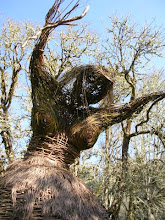In my previous blog I mentioned a brief history of
scrapbooks, and several books on the
subject. Writing With Scissors is probably the most scholarly of these, focusing as it does on some of the most historically significant albums and collections.
subject. Writing With Scissors is probably the most scholarly of these, focusing as it does on some of the most historically significant albums and collections.
Hooked on the subject by the discovery of a farm woman’s
scrapbook of clipped articles dedicated to the environment of the home that she
discovered in a used book store, Garvey went on to explore the world of
scrapbooks housed in libraries, archives, and historical societies. Scrapbooks
are often extremely personal, miniature archives of daily life not meant for
public consumption. “Every scrapbook is its own world,” she writes, “compelling
and impossibly frustrating.” She quotes from James Tate’s poem “Horseshoe” to
describe the experience of puzzling over these volumes,
I can’t
read the small print in the scrapbook:
does this
say, Relinquishing all bats, feeling
faint
on the balcony? There is so much
to be corrected here,
so many
scribbles and grumbles, blind premonitions.
How does
one interpret, on this late branch, the unexpected?






